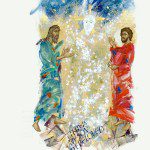Jesus Offends Me
Luke 4:16-30
 Today we find ourselves on the fourth Sunday after the Epiphany, a time in the liturgical year that takes us from the celebration of Christ’s birth right up to the beginning of Lent, Ash Wednesday, a six week season of penitence, reflection, and preparation for Easter. This little season of the year has to do with light—it begins with the story of the Magi following a star, and leads us through stories about Jesus’ disciples starting the moment they decide to follow him and meandering through stories of his ministry. Each gospel passage we hear in Epiphany helps us turn up the light just a bit. And as we read about Jesus—his words, his actions, folks’ reactions to him—the light gets turned up just a little bit more. They—and we—understand with a bit more clarity, little by little, what this man Jesus is all about. And as modern disciples, we have the task of learning—over and over again—what he came to teach us because like the first disciples…and like the modern day witnesses to the light we’ve been meeting through the sharing of members of our community…we are ALSO called to be witnesses to the light.
Today we find ourselves on the fourth Sunday after the Epiphany, a time in the liturgical year that takes us from the celebration of Christ’s birth right up to the beginning of Lent, Ash Wednesday, a six week season of penitence, reflection, and preparation for Easter. This little season of the year has to do with light—it begins with the story of the Magi following a star, and leads us through stories about Jesus’ disciples starting the moment they decide to follow him and meandering through stories of his ministry. Each gospel passage we hear in Epiphany helps us turn up the light just a bit. And as we read about Jesus—his words, his actions, folks’ reactions to him—the light gets turned up just a little bit more. They—and we—understand with a bit more clarity, little by little, what this man Jesus is all about. And as modern disciples, we have the task of learning—over and over again—what he came to teach us because like the first disciples…and like the modern day witnesses to the light we’ve been meeting through the sharing of members of our community…we are ALSO called to be witnesses to the light.
Although it is generally not my practice to intentionally offend people when I deliver a sermon, I’ll tell you that I hope somewhere in this one you might, for even just a moment, feel a little bit offended. Because I have to tell you: I couldn’t get away from the gospel lessons last week and this week without feeling with deep and firm conviction that the gospel of Jesus Christ should offend me, should offend all of us.
And when it finally does, when the light finally gets bright enough for us to understand the gospel for what it is, it is possibly only then that we begin to take in and shine out to the world around us, the radical, stretching, and revolutionary message Jesus came to teach us.
While the season of Epiphany invites us to learn again what Jesus did and said, I think we all know that it’s not easy to look back over a span of over 2,000 years and expect to have any accurate understanding of the way things REALLY were at all. Thank goodness we have the four gospel accounts of Jesus’ life found in our New Testament books of Matthew, Mark, Luke and John. These are first-person memoirs of life with Jesus, a perspective that was much closer to the real thing than we are. But because we live in a totally different world than the gospel writers lived, we have to read and listen carefully for the truth—especially during Epiphany—otherwise we’re likely to see only what we want to see.
I had a sense of the predicament in which we find ourselves as modern readers of an ancient text one day, now many years ago (14!), standing in the line to check out at the grocery store. I think I’d had a hectic morning and I was, typically, trying to squeeze in one more errand on a long list. I always try to get in the shortest line, but inevitably, I tell you it happens EVERY time, I end up in the line behind the person with 35 coupons, half expired, or I get right up to the front when the register tape jams. Anyway, one of those things probably happened . . . I can’t remember exactly which one.
I was standing there in line, tapping my foot, willing the ice cream not to melt and holding my breath hoping that my then 4 year old son Sam wouldn’t notice the lone candy bar on the lower part of the display rack right at his eye level. While we were standing there waiting, Sam suddenly looked up at me, pulling on my pants leg to get my attention, and said, “Hey Mom? I was just wondering: why are you wearing two different shoes?”
I looked down to see that Sam was right! I was wearing sandals—one black, one blue.
You could argue that I should have known I was wearing two different shoes, after all I was a grown up and had been selecting my own shoes for many, many years.
But then, you could also argue that it was more appropriate for Sam to notice the problem. After all, he was much closer to my shoes than I was.
And I was distracted by the pressures of trying to fit all my errands in that morning, juggle parenting responsibilities and try to make it home with relatively solid ice cream. Now Sam is about 6’2”, so he’s no help with this anymore…!
But think about this with relationship to the ancient gospel texts that tell us the stories of Jesus and his message. We need them, because they were so much closer to the real person and real events. And we especially need them for passages like the ones we’ve read these past two weeks, truly offensive passages.
We can never get away from reading the gospel texts with 21st century eyes, eyes that see through a lens of modern life, eyes that get distracted by the pressures of our busy schedules, eyes that play tricks on us until we do whatever it takes to fit the truly, deeply offensive gospel message neatly into the lives we live.
Today, and for most of Epiphany, we dip our toes into the gospel of Luke. Remember, if you will, who Luke was. A Gentile, educated—a doctor, to be exact, a writer who took great pains to provide details, lots of details, to make sure everyone who read his account—Jew and Gentile alike—got the very clear message Jesus was trying to get across.
And so, in his recording of the gospel, Luke begins, not with a party like John did, but with a difficult story of Jesus going home to Nazareth. If we read carefully, listening with rapt attention to one who was much closer to the events as they unfolded than we are, we might find that, like the people in the synagogue that day, we feel a little, well . . . offended by Jesus and the message he came to preach.
Here’s how it went down. In verse 14 Jesus had come home to Nazareth . . . and, what a homecoming it was! The text says that a report about him had spread throughout the surrounding countryside and there was quite a buzz that he was there—everyone flocked into town to see how far the boy from Nazareth had come and to have conversations with each other about what part exactly each person had had in his success. From the reaction of the people there I am almost certain that there must have already been a sign posted at the outskirts of the town: “Nazareth, Galilee, Hometown of Jesus Christ.”
After years and years of waiting for someone to come and save them from the oppression of Rome, to help them become an independent nation again, they had begun to hope that this hometown boy might be the one.
They loved him, or at least the him they thought they knew; to them he was beginning to seem like the hope they had been waiting for. At this stage in their relationship with Jesus, all they could think about was the incredible future they imagined that he would help give them. They were pinning all their hopes on him.
The text says he began to teach in the synagogue there in Nazareth and attended their services, just like he had every Sabbath growing up. It was an honor for the folks in Nazareth to welcome this homegrown celebrity back among them, so of course the rabbis asked Jesus if he would do the special task of unrolling the precious Torah scroll and reading the Torah portion for the day.
Jesus looked through the writing on the scroll until he found some passages in Isaiah that described the relationship he intended to have with the people in Nazareth—with all the people he encountered during his ministry, in fact. (You should never let the preacher choose the passage. Too dangerous.) Will Willimon says, “Jesus threw the book at them.” He chose and read the passage from Isaiah that represented who he was and what he intended to do . . . .
And then, he sat down.
The eyes of everybody in the synagogue were fixed on him, the text says. They had waited with urgent anticipation to hear what he would say, and now that he’d read this passage from Isaiah, they didn’t quite know what to think. The part he chose to read was all about bringing good news to the poor and releasing prisoners and restoring sight to the blind. In general, it all sounded good to them, but there was a nagging thought in the back of their minds as they listened.
Well, everyone just kept looking at him, and you can almost imagine the silence hanging heavy in the air, the whole town eagerly awaiting a political call to arms. The text says he got up again and began to preach—not just read the text, but proclaim a message. And Luke records for us the message Jesus had for them…and for us: “Today this scripture has been fulfilled in your hearing.”
That was it—that was the phrase that was at the heart of this gospel Jesus was preaching.
There were radical and unconventional, life-turning-upsidedown kinds of things about to happen, and they would happen right here . . . it wouldn’t be just Jesus ushering in the kingdom of God; instead, God’s kingdom, the one in which the blind see and the oppressed go free, would come to be right here, through the radical witness and faithful living of anyone willing to enter into this transforming relationship with Jesus Christ.
Please note Jesus did not say: “I hereby announce my intention to conquer the Roman government.”
He did not say: “All those who would like to be healed, please form a line to my left, with members of the most prominent families taking priority.”
He did not say: “I am now interviewing candidates for the positions of secretary of state, minister of defense and director of homeland security.”
He did not say: “In exchange for a generous contribution to my campaign, I will be happy to stop in at your house and have dinner with your family.”
No, he said: “Today this scripture has been fulfilled in your hearing.”
Today the promise of Messiah, the message of the gospel, good news, is coming out into the harsh light of day and all of you, you who know me best, get to become the radical living out of God’s message of love for the world.
Wait, wait, wait just a second.
When he’d first started reading, everybody loved the it—after all, Israel was a nation living under crippling oppression, with no power at all. Reading passages like this made them feel vindicated, like God was on their side. But when Jesus suddenly got all personal, well, they got offended. What do you mean, I have to change? What do you mean my life has to reflect, on a personal level, the prophets’ call to do justice, love kindness, walk humbly with God? Surely you mean the Roman government…what do you mean, me?
I think like all of Jesus’ hometown folks, gathered in the synagogue that day, sometimes we love passages like this, too. Initially. As long as we have the luxury of holding them at arms’ length.
Because there’s no doubt: there are broken systems in our world—they need to change. There is an insidious undercurrent of racism and sexism and inequity in our country—whew, somebody’s gotta do something about that. Wars are raging around our world, displacing some of the most innocent and vulnerable—that’s really bad.
Yes, yes, and yes.
But when we do the work of Epiphany and see this passage in the clear light of Jesus’ gospel, everything starts to get personal. And offensive.
Jesus never meant for the leaders of the temple—or for us—to spiritualize the words of the prophet Isaiah. Right there in the temple, Jesus was looking his community, people of faith, straight in the eyes and saying: this has to start here. Now. In you, and you, and me, and all of us.
And do you remember what happened? Do you remember? Luke says the people listening were filled with rage. Not annoyed, disappointed or bored . . . filled with rage. They organized and made moves to take Jesus and throw him off a cliff. That’s how mad they were. That’s how offended they became . . . when they came face to face with the gospel.
I sure hope you hear this message today and feel just a little offended.
Me, too.
The message Jesus came to preach is a message of challenge—utter and difficult challenge—that pushes us all to places of discomfort—pain, even, a message that makes all of us look hard at our hearts and think about just how they need to stretch.
True sacrifice that makes a difference in the life of someone who has less than I do; relationships that practice the difficult discipline of community, of truth telling; communities that work together even when we’d prefer to promote our individual agendas; people who engage in real forgiveness and reconciliation with someone who you’d rather forget altogether . . . doing the hardest thing ever to reach out and heal situations you’d rather leave by the side of the road and move on . . . so that your life reflects the radical reconciliation Jesus came to show us.
Oh, that hurts. It hurts and it’s so very offensive . . . .
Jesus offended all the people in the synagogue that day because he wasn’t giving them what they wanted or expected—a nice, sterile, self-righteous pep talk. He was asking them to stretch, to make hard decisions on behalf of the poor and the outcast, people they didn’t like and folks they’d worked their whole lives to avoid.
And when they saw him clearly, they were so mad they wanted to kill him. Eventually, they did.
2,000 years later, even this far away, if we look hard through the growing light of Epiphany, if we’re serious about being followers of Jesus, about really living the gospel like we mean it, about opening our own hearts to change until this prophecy is fulfilled right here in our hearing, in and among all of us, well then, there’s absolutely no reason that you and I should leave The Riverside Church today anything less than . . . deeply and life-alteringly . . . offended.
Amen.












